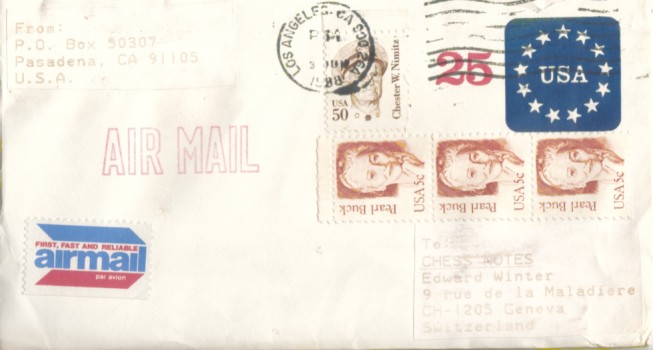
Edward Winter
We have compiled a non-exhaustive list of magazine items (pre-Second World War) on chess and Jews:
‘Jewish Players. The Jewish Standard says: “It seems strange that the chess championship of the world should be again fought out between two Jews. The pre-eminency of our brethren in this particular game is hard to understand, and certainly ought to give the lie to the current accusations that Jews are not fond of acting on the square.’
‘If there is such a thing among the Jews as a “National game”, surely that title belongs by overwhelming right to the royal game of chess. The peculiar charm of chess, which affords entertainment at the same time that it instructs, has appealed from time immemorial to the race. Chess is more than a mere game, and those who “play” at it are known to the really expert as “woodshifters”. The masters have raised it to the dignity of a study, and many there are who regard it as equal with the arts and sciences. For upward of 50 years there has not been a tournament of any account in Europe or America that has not had a Jew taking a prominent part therein, and today, as has been the case often [sic] before, the world’s champion is one of them.’
After listing various Jewish chess figures, the item concluded:
‘All these form a goodly company, who, were it possible to array them side by side, could easily sweep from the field any team of equal numbers composed of all other nationalities. What more indeed could be said in support of the claim that in the world of chess the Jew reigns supreme?’
‘“I have often been struck with the ubiquity of the Jewish chessplayer”, writes Mr A. Porter, in the American Hebrew. “I once saw in a café in Tunis two well-to-do Jews playing a game that would have done credit to the leading players of New York or London; in going through the steerage of a North-German Lloyd liner, westward bound from Bremen, I noticed three games by German Jews in progress, and on a summer’s day at the Delaware Water Gap, on reaching the top of Mount Minsi, expecting to be the monarch of all I surveyed, I found the summit already occupied by two young Jewesses engaged in mimic warfare on the chess board.”’
‘Mr Sharp, chess editor of the Reading Observer, gives a very interesting account of the connection of the late Dr Hermann Adler (Chief Rabbi) with chess. In his younger days, in common with so many learned Jews, he was very fond of chess. Lasker, of course, it is well known, is a Jew, and that great man Steinitz was of the same persuasion. Wilhelm Steinitz once expressed the opinion that the reason why Jews are so clever at chess is because of their patience, pure breeding, and good nature. Having been the most persecuted race in the world, they have had the least power to do harm, and have become the best natured of all peoples. Their religion, also, is a factor which contributes in the same direction, because it is combined with persecution to preserve their morals and good nature. Then the purity of their breed, as Steinitz asserted, largely helps the Jews in every walk of life, and contributes to their remarkable success, even in the science of chess …’
More particulars are sought on the above statements by Steinitz.
‘It is a curious fact that of the 26 competitors no less than half were Jews. The rivalry on strictly logical lines characterizing the game of chess, and the scope for ingenuity it affords make, we fancy, a special appeal to the Jewish temperament. Anyway, in a considerable experience we hardly remember to have met a single individual of that race who did not display at least some intelligent appreciation of the game.’
‘Since chess entered upon its third period of splendour, the period in which we actually are, the Israelitish element has exercised a predominance out of all proportion to the number and position of the Jews.
The branches of activity are well known in which the Israelites have excelled for so long, and, as it were, by the force of atavism – banking, business, industry. In chess their supremacy began to manifest itself scarcely two generations ago. It has not ceased to grow stronger and stronger since then.
If this fact has a meaning from the point of view of culture, it must be this, that the nineteenth century is the century of the emancipation of the Jews.
When we apply our observations to Russian affairs, we see the latter suddenly made clear in a blinding flash of light. The expansion, the formidable development of Russian chess, is more or less confined to the short space of time between 1904-1918; the period in which the Judaeo-Russian masters affirmed themselves victoriously, the period of the tournament triumphs of Rubinstein – the same Rubinstein who used to conduct in his native town of Lodz a chess column in a little Yiddish paper, printed in Hebrew characters.
The dates mentioned are those of the two Russian revolutions, the first of which, as we know, was averted, while the second succeeded completely. If it brought to the Allies the cruellest surprise and deception, on the other hand it procured for the Russian Jews their absolute emancipation, if not power. Yiddish has henceforward become an officially-recognized language, and the German philologists, who up to now have neglected and despised this idiom, are devoting themselves to it with fervour.
So the evolution of chess proceeds equally with the formidable Messianic movement which has been manifesting itself for some decades in the Jewish people, and is now crowned by the hope of seeing the ancient kingdom of Israel re-established in the land once flowing with milk and honey. I can foresee, in the not very distant future, the great world’s championship tournament being held in Jerusalem.
I trust that a Gentile will be pardoned for thus pointing out the meaning of the development of chess among the Jews. The question whether this development is favourable to our game or not is quite immaterial. The phenomenon exists, plain and indisputable. Philosemitism, Antisemitism, Indifferentism have no existence in face of the reality of things. It is a curious and significant fact that chess, which in its early form, at the dawn of the Middle Ages, was brought to its height by the genius of the Semitic race, has in its modern form been actually carried to perfection again by the genius of the same race.’
‘I presume it relates more particularly to chess professionals. In this country, at any rate, it does not seem to me that the Jews hold rank amongst first-class amateurs in proportion to their numbers. In London there are very few if any of the class of R.C. Griffith, G.A. Thomas, J.H. Blake, H.G. Cole, E.G. Sergeant, and many others, to say nothing of the youngest recruits, W. Winter and R.H.V. Scott. It has, of course, been questioned whether it is desirable for a man of intellect to become purely a professional chessplayer, though no doubt in many cases it means a gain to the chess world and no very great loss otherwise. With regard to “Chess and the Jews” I feel inclined to think that in absolute genius the non-Jewish element holds the palm, from Philidor, Labourdonnais, Morphy, down to Pillsbury and Capablanca. I think a team of “gentiles”, as your correspondent calls them, could hold their own against any combination, if selected from Capablanca, Alekhine, Teichmann, Schlechter, Maróczy, Marshall, Atkins, Duras, Vidmar. In point of number I suppose the Jews would prevail. At Petrograd in 1914 there were only four “gentiles” out of eleven, but three of them were amongst the five prize-winners, and the fourth, J.H. Blackburne, was 72 years of age at the time. As your correspondent says, Philosemitism, Antisemitism or Indifferentism have nothing to do with it, but the facts are not quite so convincing as he makes out.’
‘The well-known chess enthusiast, Peter P. Saburov, writes to point out some errors in Mr Fainlight’s article from the Jewish Encyclopedia. He states that Schiffers, Schlechter and Zukertort were not Jews. Zukertort was the son of a Pastor. Emanuel Schiffers (not B. Schiffers as stated on page 239) was a Russian of German origin; he was born in Petrograd, but his ancestors were from Aachen. Schlechter was a German-Austrian and a catholic.’
(On page 13 of Carl Schlechter! Life and Times of the Austrian Chess Wizard (Yorklyn, 1994) Warren Goldman wrote that Schlechter ‘was born of a Catholic family known for its industry and creativity in the field of music’.)
‘A correspondent writes: “With all deference to M. Saburov (BCM, page 371), the great Zukertort was of Jewish race, whatever the religion of his father. The name Zukertort (? Zucker-torte, ‘sugar-tart’) probably derives from the period when the Jews were compelled by the authorities to adopt surnames very often fancy, in place of their original patronymics. Is it not also a fact well known to such as are sufficiently veteran to remember him distinctly that the famous master was clearly a member of the race which has given the world so many illustrious chessplayers? My own recollection of him is perhaps too juvenile to trust.”’
‘The Wiener Schachzeitung has become a weekly instead of a fortnightly, and its great popularity is likely to increase thereby, as there is something very attractive in the idea of getting a chess paper with hot news every week.
It remains to be seen how recent events will affect chess in Austria, but the effect will certainly be adverse. Many, if not most, of the leading masters in Austria, as in many other countries, are of the Jewish race. German chess is now a shadow of what it was.
In no field have the Jews excelled more than in chess. A New Zealand correspondent gives us the following list of famous Jewish masters: Löwenthal, Zukertort, Steinitz, Chigorin, Lasker, Schlechter, Janowsky, Winawer, Tarrasch, Rubinstein, Bernstein, Spielmann.
Among younger masters we have Reshevsky, Fine, Kashdan, Dake, Simonson, Horowitz and many other Americans; Flohr, Botvinnik, Levenfish and so on ad lib. Strangely enough, no Jewish player has won or even competed for the world championship since Lasker lost it in 1921 – yet two Jews held the title for the first 55 years. Steinitz was the son of a rabbi and was to have been a rabbi himself; Lasker is also a professing Jew. Reshevsky belongs to the strictest of all Jewish sects.
H.G. Wells, himself a chessplayer, mentions the eminence of the Jewish race in chess, in his History of the World. He appears to attribute it entirely to an innate sense of values – a capacity for judging between relative gains and losses with the utmost subtlety.
That is almost certainly a factor, but one could also argue from the fact of racial oppression. The reaction to the oppression has been a tendency among Jews to strive to excel in whatever they take up, whether it be commerce, mathematics, chess or purely artistic spheres in which H.G. Wells’ idea would not apply.
Again, in countries where there actually has been oppression of Jews from time to time there would be a tendency for them to seek fields in which they would depend entirely on their own efforts, and not on such things as official preferment.’
The following exchange of correspondence between Bobby Fischer and the Encyclopaedia Judaica was received by us in 1988 from Fischer’s address in Pasadena:

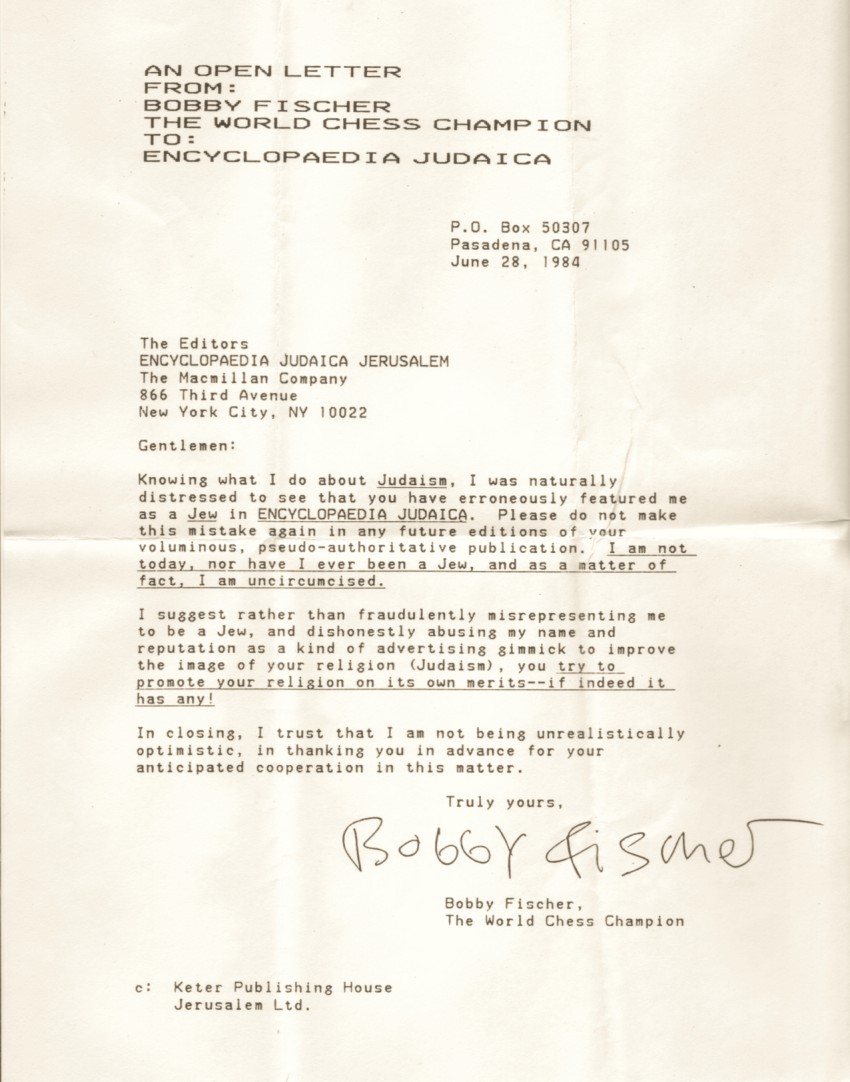
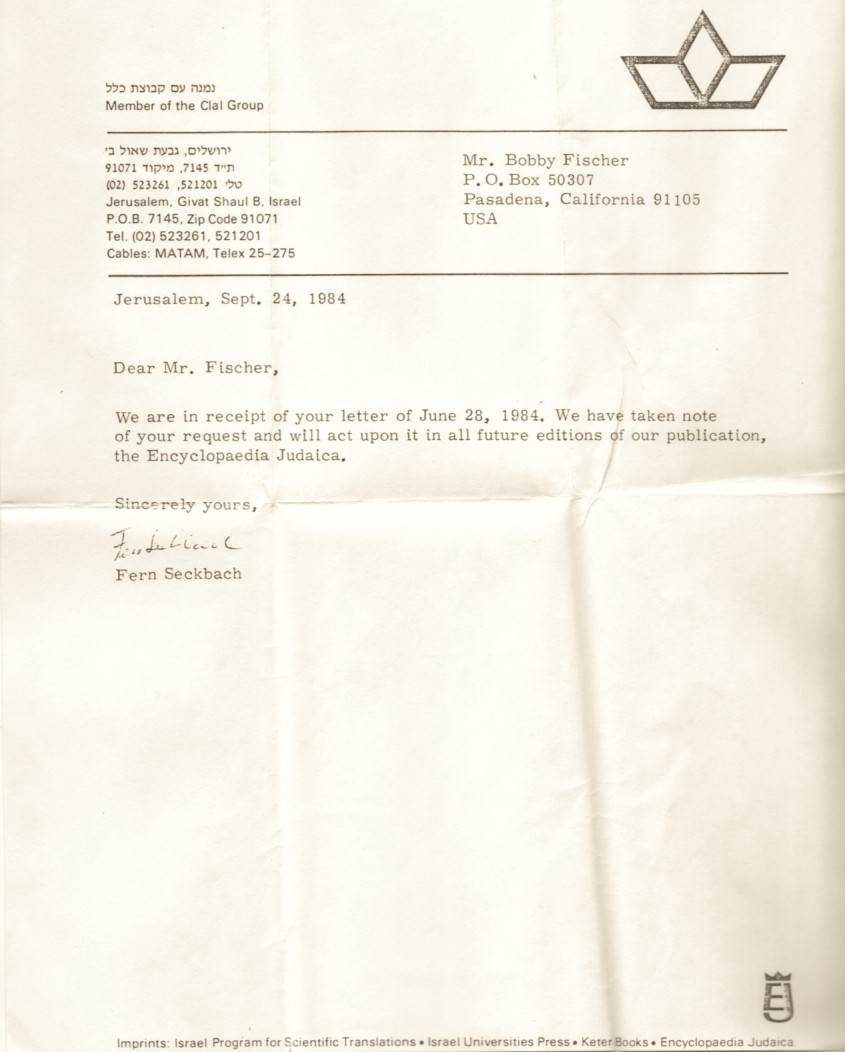
(1671)
From George Stern (Woden, Australia):
‘C.N. 38 [see Chess and Bridge] refers to the late Gerald Abrahams as “an authority on both chess and bridge”. I cannot judge the quality of his expertise in bridge, but I am less than an ardent admirer of his in the field of chess. I have before me the 1975-6 Year Book of the Encyclopaedia Judaica (Keter Publishing House Jerusalem Ltd.) On page 253, under the heading of “Chess” , Gerald Abrahams writes:
“Bobby Fischer lost the World Championship in 1975 when he refused to play the challenger Vassily Karpov. ... The British chess championship held in August 1974 ended in a tie between seven players, of whom three, William Hartstone, ... Jonathan Mestel, ... and Michael Stean, are Jewish. ... The play-off was won by Botterell.
... Israel chess has been further strengthened by the arrival from USSR of Grand Master Leonid Shumkovitch ...”
The entry ends with a blurb for his book, Not Only Chess. In the Decennial Book 1973-82 of the same work (issued by the same publisher), on page 205, under the byline this time of Gerald Abrahams/Editor, the article on chess refers to “Vassily Karpov” , “William Hartstone” , “Jonathan Mester” and “Leonid Shumkovitch”; and there is another blurb for Not Only Chess. Incidentally, after reading the earlier volume, I wrote to the publisher pointing out the errors; but the only impact this had on what appeared in the later volume was that it induced the publisher to add a new error – “Jonathan Mester”.’
We note a further mistake added in the Decennial Book: ‘Three of the seven participants in the British Chess Championship held in August 1974 were Jewish ...’, whereas the tournament had 32 players. The 1982 book gives no indication that Abrahams had died in 1980.’
(1739)
Below is part of C.N. 1971, dated 9 May 1993:
On 7 January 1993 Yasser Seirawan gave a telephone interview (lasting nearly three hours) to Hanon Russell for the USA Today Sports Centre. Seirawan’s comments on Fischer, with whom he spent about 15 hours during the 1992 Spassky match, are of particular interest. Some extracts follow, slightly edited by us ...
On Jews:‘He explained to me that he was raised in a Jewish household, that he was basically abandoned by his father and that although he lived with his mother Regina, she went on to her education studies, left two children (his sister and him) at home, and he was very much abandoned as a child. I think that this terrible experience certainly affected him throughout his entire life. But he also explained to me that he was brought up in a chess community in Manhattan. He had to have a lot of savvy. There was an enormous number of Jewish people in the chess world, in New York, whom he communicated with on a constant day-to-day basis. Many helped him, and he acknowledges that. A little entry fee here, a book there, a ride there, etc. But he also says that many, many times he has had business affairs with Jewish businessmen which have not worked out. As a result of these experiences, his answer is “I don’t want to deal with Jews any more. That’s just the way it is. Yasser, I’m sorry, it’s a closed question”.’
When Seirawan argued that Fischer was ‘condemning a whole group of people’, Fischer replied: ‘Yasser, I know you think I’m being unfair. It’s just my experience. My reasons.’ Seirawan commented to the interviewer that Fischer ‘is a racist, he is not a Nazist’ and that he ‘magnifies his problems out of proportion. He takes his problems and puts them on the world stage’.
For the full text of C.N. 1971, see pages 211-212 of Kings, Commoners and Knaves and Instant Fischer.
On page 7 of his book Farewell to Germany (London, 1959) Heinrich Fraenkel (who wrote on chess under the pseudonym ‘Assiac’) described his enforced departure from the fatherland:
‘Some time in 1932 I had accepted the position of Berlin correspondent for Variety, the New York show-business journal. It was a mere side job for me, even though I had to file quite a few thousand words every week. Now it so happened that a week or two after Hitler’s accession, Variety printed a Berlin news item which the new regime promptly branded as “atrocity propaganda”. It certainly wasn’t, but whatever the truth of that paragraph – it dealt with the undeniable fact that an American film executive had been beaten up by power-drunk storm-troopers combing the Kurfürstendamm for persons who appeared to them to “look Jewish” – I had not filed the story; it came from an American News Agency. However, since I was listed as the paper’s Berlin correspondent the wrath of the Gestapo descended on my head (or, more precisely, on my flat, which was completely ransacked).
Fortunately I had been warned by friends and I wasn’t at home that night. It happened to be the night after the Reichstag fire, when thousands of people were arrested for alleged conspiracy in that crime. In point of fact they were a motley assortment of persons disfavoured by the new authorities for one reason or another. Well-connected friends told me that it would be wise for me to get across the frontier almost at once. I did so and without very much trouble.
I first went to Paris for a few months and then to London.’
(3244)
An article by Emanuel Lasker, ‘Jude, wohin?’ on page 1 of Aufbau, 1 January 1939:
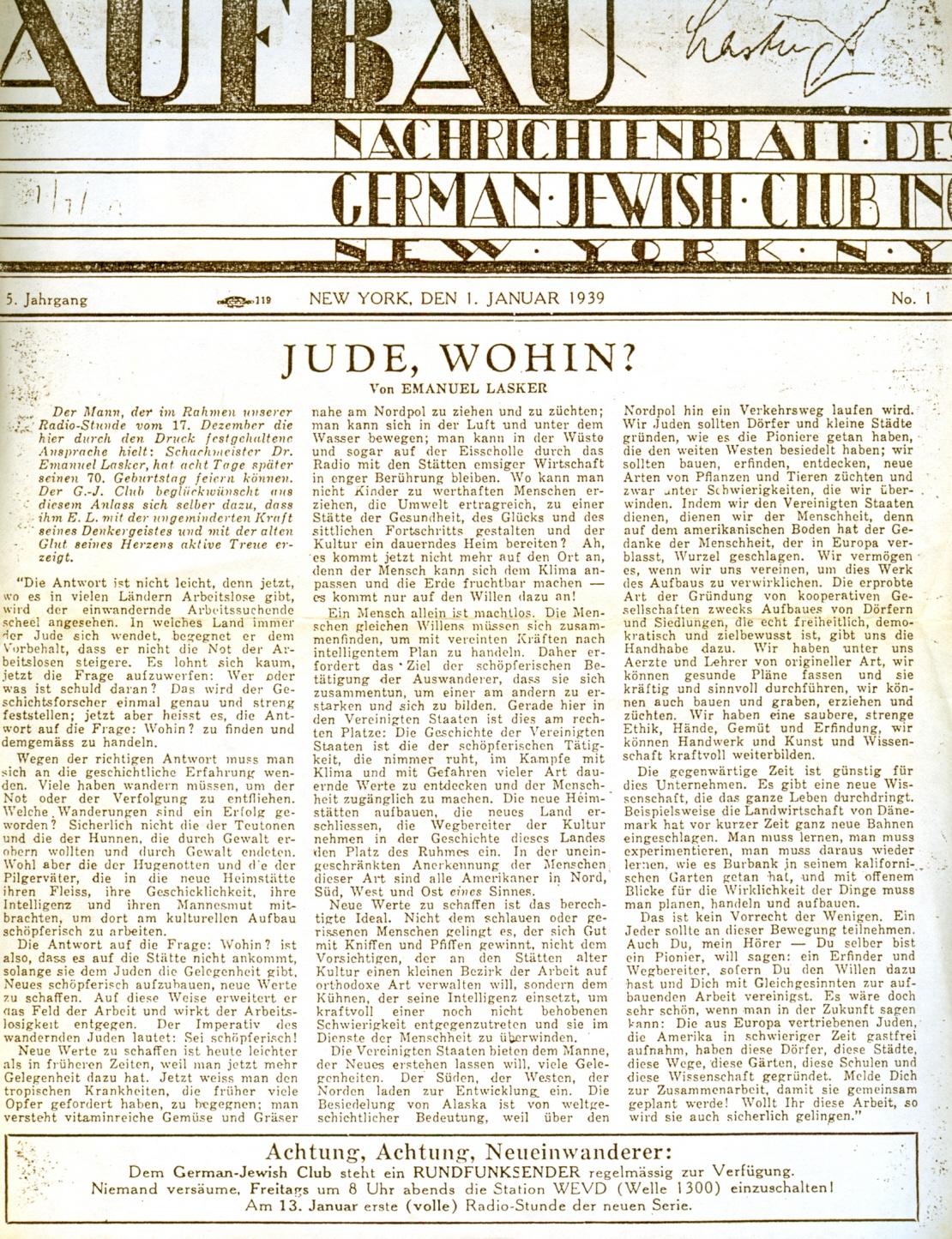
Regarding the deletion of Jewish players’ names from Kurt Richter’s book Kombinationen (1936 and 1940 editions) see Patriotism, Nationalism, Jingoism and Racism in Chess.
João Pedro S. Mendonça Correia (Lisbon) asks about the accuracy of reports that Tarrasch converted from Judaism to Christianity.
His conversion is documented on pages 357-359 of Siegbert Tarrasch Leben und Werk by Wolfgang Kamm (Unterhaching, 2004). The opening sentence of the section reads:
‘Am 28. Mai 1909 tritt Siegbert Tarrasch, der Jude, zum christlichen Glauben über.’
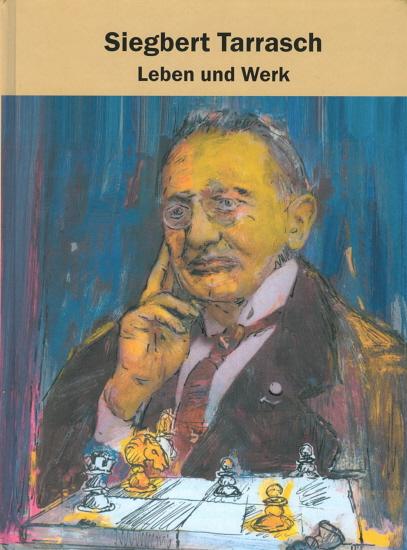
Kamm’s 877-page book (see C.N. 3462) offers by far the most detailed biographical treatment of Tarrasch but has received remarkably little attention.
(5997)
João Pedro S. Mendonça Correia writes:
‘Does anyone have an explanation for the fact that, despite his stature in the chess world, Tarrasch was not attacked by the author of the infamous 1941 articles on Jewish and Aryan chess? I do not believe that his (now confirmed) conversion in 1909 from Judaism to Christianity (C.N. 5997) would be a satisfactory explanation.’
(6067)
The account on pages 357-359 of Siegbert Tarrasch Leben und Werk by Wolfgang Kamm (Unterhaching, 2004) stated that on 28 May 1909 Tarrasch converted from Judaism to Christianity. Have further details come to light since 2004?
(12196)
Avital Pilpel (Haifa, Israel), who conducts the Jewish Chess History website, informs us that Moshe Roytam has found this chess column on page 55 of Davar, 27 September 1935:
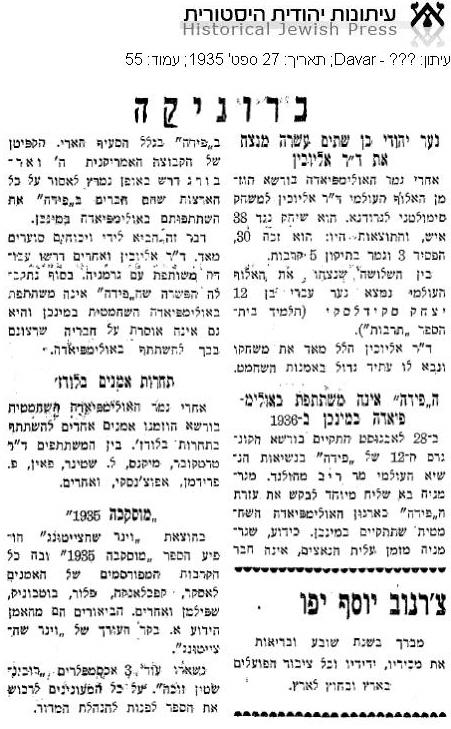
The column is available on-line via the Historical Jewish Press website. Mr Pilpel comments:
‘The editor of the chess column in Davar, Moshe Marmorosh, states that at the 1935 FIDE Congress, the US representative, Wahrburg, demanded that no FIDE member should be allowed to participate in the Munich Olympiad in 1936, owing to Germany’s anti-Semitism. This, reports Marmorosh, “led to a heated discussion”, with “Dr Alekhine and others” advocating “working together with Germany”. Eventually there was a “compromise solution” whereby (as noted in your article on the 1936 Munich Chess Olympiad) FIDE would not be officially involved but would allow individual teams freedom of choice.’
Our article on the Munich Olympiad quoted from pages 10-11 of the minutes of FIDE’s Congress, held in Warsaw in August 1935. The matter was also mentioned on page 446 of the October 1935 BCM:
‘The new German C.A. is not affiliated, but a representative was present seeking the support of the FIDE for a team tournament at Munich next year concurrently with the Berlin Olympiad (athletics). Some opposition was offered on account of Germany’s non-affiliation, but eventually on a vote it was left to each country to take its own line on the matter.’
A more detailed account appeared on pages 140-141 of the September 1935 Schweizerische Schachzeitung:
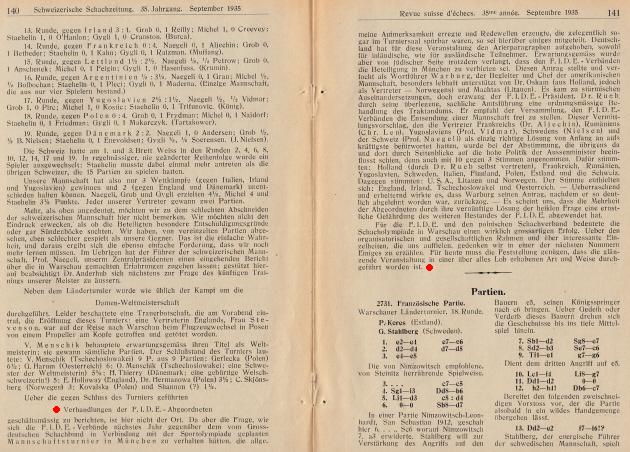
To summarize the Swiss magazine’s report: The FIDE discussions were rather heated and could occasionally even be heard in the playing hall. Germany had removed the Arierparagraph (the ban on non-Aryans) with regard to German and foreign participants. Nevertheless, ‘the Jewish side’ demanded that FIDE member nations be forbidden to participate in the Munich Olympiad. This was proposed by Wahrburg, who received particularly strong support from Oskam and Machtas. Rueb recommended to the Assembly that each nation should be left to decide whether it wished to participate. This compromise, which from the outset was strongly supported by France (whose representative was Alekhine), Romania, Yugoslavia, Sweden and Switzerland as the only correct solution, was eventually accepted by ten votes to three. Great Britain, Ireland, Czechoslovakia and Austria abstained. A surprising and amusing point, the Schweizerische Schachzeitung added, was that Wahrburg withdrew his motion after it had been so clearly rejected. The magazine considered that the FIDE delegates had averted serious danger by finding a sensible solution to a difficult issue.
The illustration below, which includes Richard M. Wahrburg, comes from page 175 of the August 1935 Chess Review:
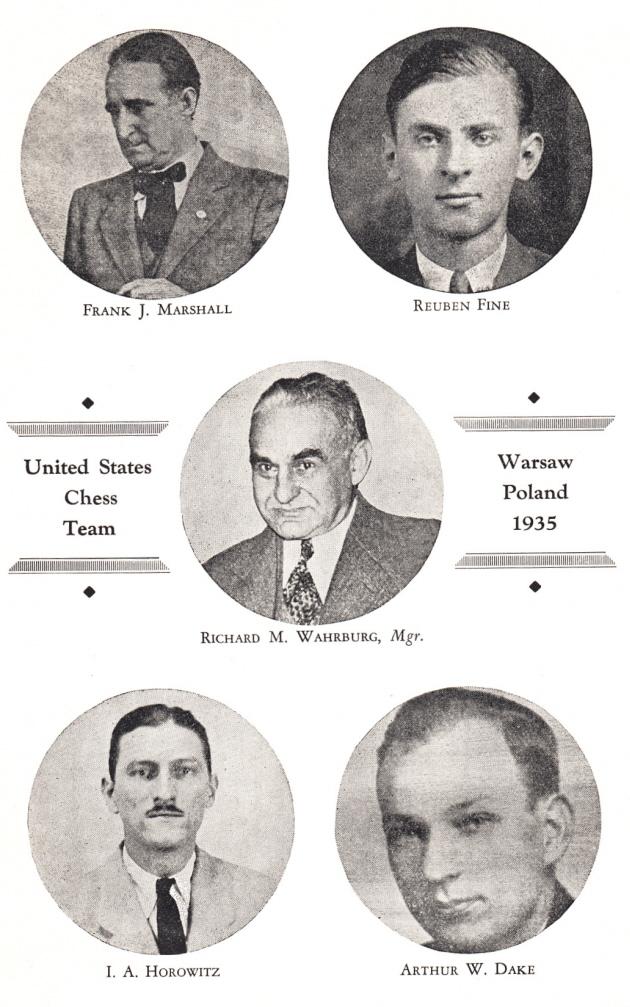
(7601)
David Nudelman (Hamden, CT, USA) is seeking information on a publication by Steinitz towards the end of his life about anti-Semitism in Vienna and elsewhere. In various Russian sources the title is given as ‘Мой ответ антисемитам в Вене и где бы то ни было’.
Pages 231-232 of The Steinitz Papers by Kurt Landsberger (Jefferson, 2002) gave an English translation of an article published in the ‘Berliner Anzeigung’ (sic – Anzeiger) of 20 March 1897 which quoted Steinitz as follows:
‘After every match I am always very excited and do not feel well, but it has never been as bad as in Moscow. I am, however, my own doctor; as a passionate Kneippianer I cure myself with cold water, which has always helped me. This time it took longer and I could not hold my thoughts together, which saddened me since I wanted to write my book “Judaism in Chess” as quickly as possible to combat anti-Semitism.’
The newspaper article added:
‘Steinitz had engaged a young Russian with language abilities as secretary since he wanted to dictate it simultaneously for German and English publication.’
The paragraph below comes from page 167 of the May 1897 BCM:
‘Mr Steinitz has been playing off-hand games at Vienna with Herr Schlechter, with about an even result. He is said to be now writing a book entitled “Das Judenthum im Schach” (“The Jewish Element in Chess”).’
A work of that title had been mentioned on page 122 of the April 1897 Deutsche Schachzeitung.
(7952)
David Nudelman submits this title page:
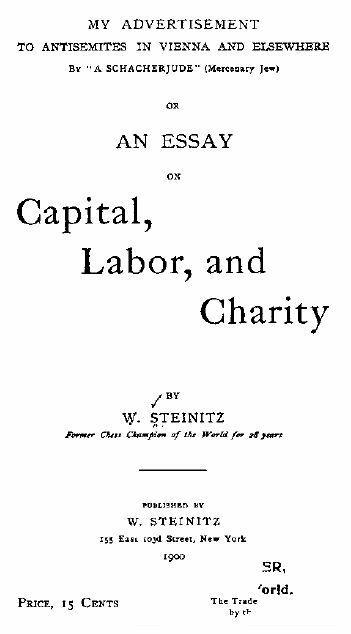
See too pages 382-386 of William Steinitz, Chess Champion by Kurt Landsberger (Jefferson, 1993).
(7969)
The Center for Jewish History has a number of sketches of leading masters by Emery Gondor. They are dated 1922.
A search for ‘Lasker’ also yields some interesting illustrations, including a fine version of the photograph of Edward Lasker and Emanuel Lasker at the board (given in the Dover reprint of the New York, 1924 tournament book, although not in the original edition).
(8457)
Gerald Abrahams was the author of The Jewish Mind (London, 1961), and our collection includes a copy inscribed by him:
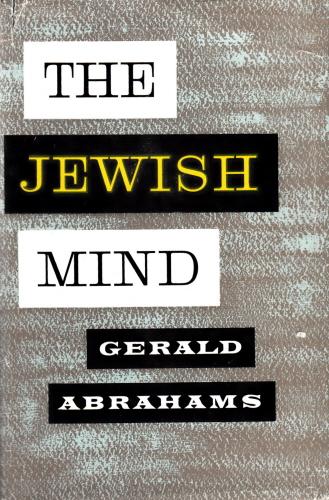
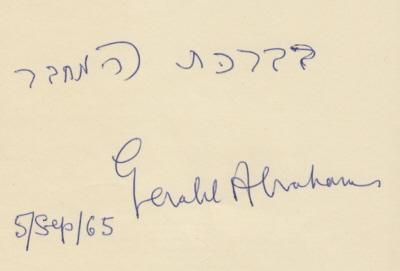
The Jewish Mind has a few references to chess in the footnotes, including the following on page 354:
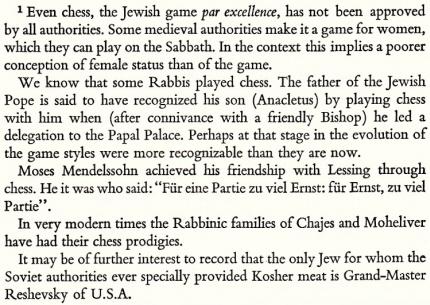
(8824)
An item that we wrote on pages 23-24 of Kingpin, Spring 1992 (see too page 197 of Kings, Commoners and Knaves):
Who was the first to claim the title of world chess champion? Those who thought that it might have been Steinitz will be put right by page 23 of The Great Jewish Chess Champions by Harold U. Ribalow and Meir Z. Ribalow (New York, 1986):
‘Albert Alexandre, a Frenchman who claimed the world title in 1776, was a Jew.’
The co-authors may have meant Aaron Alexandre, even though he was only about ten at the time. Appropriately, the book’s dust-jacket mentions that ‘the Harold U. Ribalow Award is presented annually by Hadassah magazine for an outstanding English-language work of Jewish fiction’.
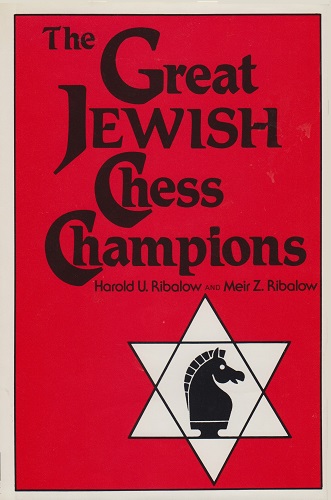
Another example of the book’s shoddiness is this ‘once’ dialogue on page 28:
‘Steinitz, a German Jew, was also baited by one of his rivals, the fine player Johannes von [sic] Zukertort who, unfortunately, was anti-Semitic. A feud developed between the two and Zukertort once said to Steinitz, “You are not a chessplayer, but a Jew”. The great champion’s cutting reply was, “You, apparently, are neither”.’
(10038)
A 317-page hardback (biographical entries):
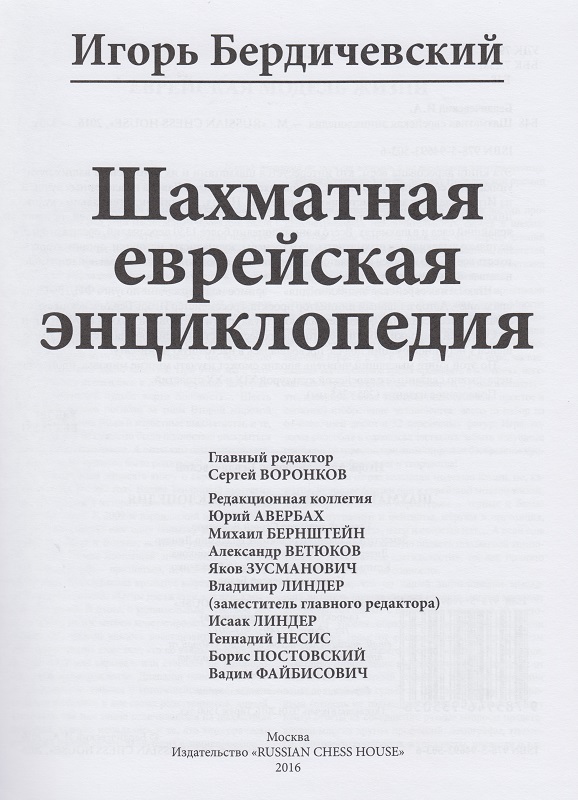
Writers who discuss chessplaying Jews tend to have a shaky grasp of basic facts. [Pages 52 and 62 – see C.N. 1321] of David Spanier’s Total Chess (1984 and 1986 editions) described both Carl Schlechter and Vassily Smyslov as Jewish. Famous Chess Players by Peter Lerner, a children’s book published in Minneapolis in 1973 which has been brought to our attention by Louis Blair, states (page 38) that among the Jewish players whom Alekhine supposedly attacked in his Nazi articles was Max Euwe. It may be recalled that the Pariser Zeitung articles themselves wrongly included Kieseritzky and Schlechter as Jews.
(Kingpin, 1995)
C.N. 10497 gave excerpts from the article ‘Reflections after Reykjavik’ by Gerald Abrahams on pages 84-90 of Encounter, March 1973. The concluding paragraphs:
‘There remains one question. Why has the Chess Crown, since the death of Alekhine, rested on Jewish heads (except when it was borrowed by an Armenian)? To say that it is because there are still many Jews in Russia is not a sufficient explanation.
My own theory is that Jews, through evolutionary processes, have become good at languages. To be good at languages it is desirable to reach maturity early, and grasp the accidence and syntax and important vocabulary at an early age, so that while the mind is still young the student can express himself fluently and with mastery.
Among languages I include mathematics, music and chess. Different inter se, these systems are only grasped creatively by those who early grasp the technique. The particular Jewish control of chess is one instance of this process realized.
As for Fischer’s control of chess, let it simply be said that from now onwards the phrase Grand Master is meaningless.’
On the question of whether Richard Réti was Jewish, see C.N.s 4834, 4856, 5335 and 11533.
Concerning the requirement under the Nazi régime for Jewish men and women to adopt a second forename (Israel and Sara respectively), see C.N.s 11532 and 11550.
C.N. 11572 gave the full text of a report on page 2 of the Weston Mercury and Somersetshire Herald, 7 March 1908 of a visit to Weston-super-Mare by Emanuel Lasker. It included the following:
‘Dr Lasker is of Jewish extraction and, by way of preface, it may be mentioned that there is considerably more in that fact than would prima facie appear, for the championship in the king of games has been retained in Jewish hands for no less than 42 years, Steinitz holding it for 28 years until 1894, while the subject of the present notice has been champion ever since. Dr Lasker himself attributes predominance of the Jewish genius in chess to the fact that its rules are entirely based upon those of self-defence in the struggle for life, of which art Jews are adepts.’
See too C.N. 1689. Further references are provided in the Factfinder.
To the Chess Notes main page.
To the Archives for other feature articles.
Copyright: Edward Winter. All rights reserved.